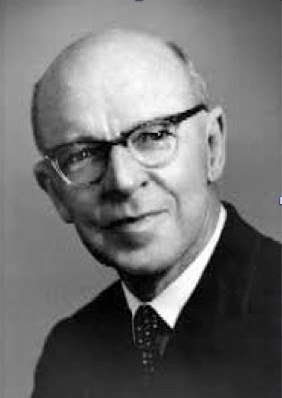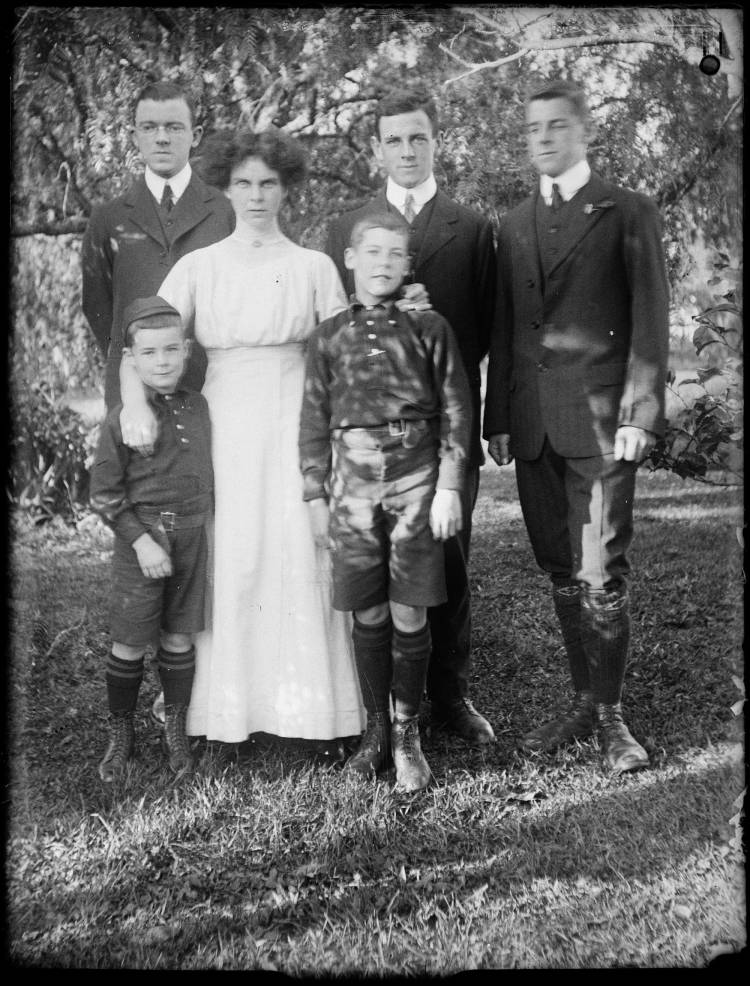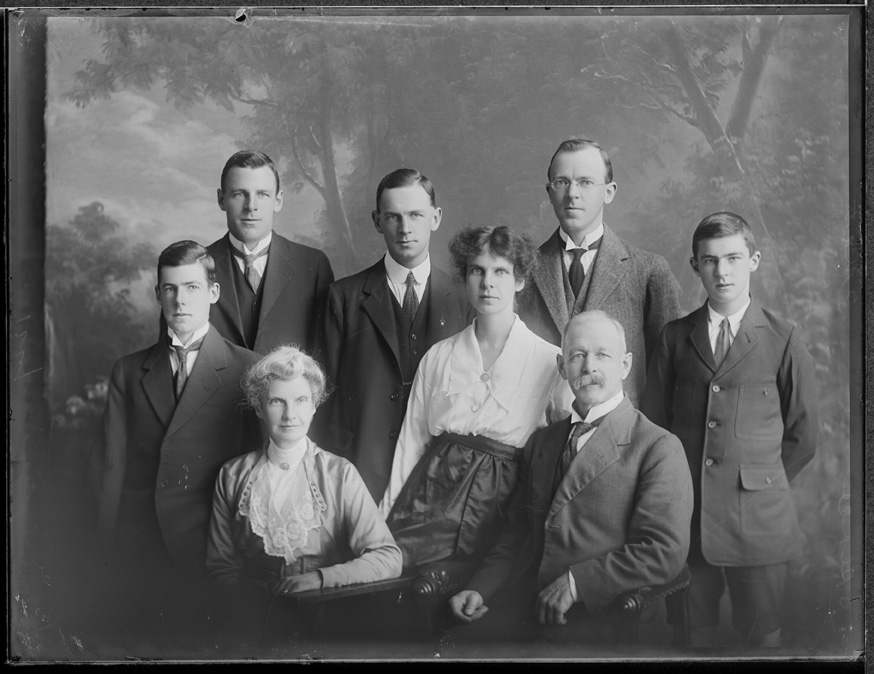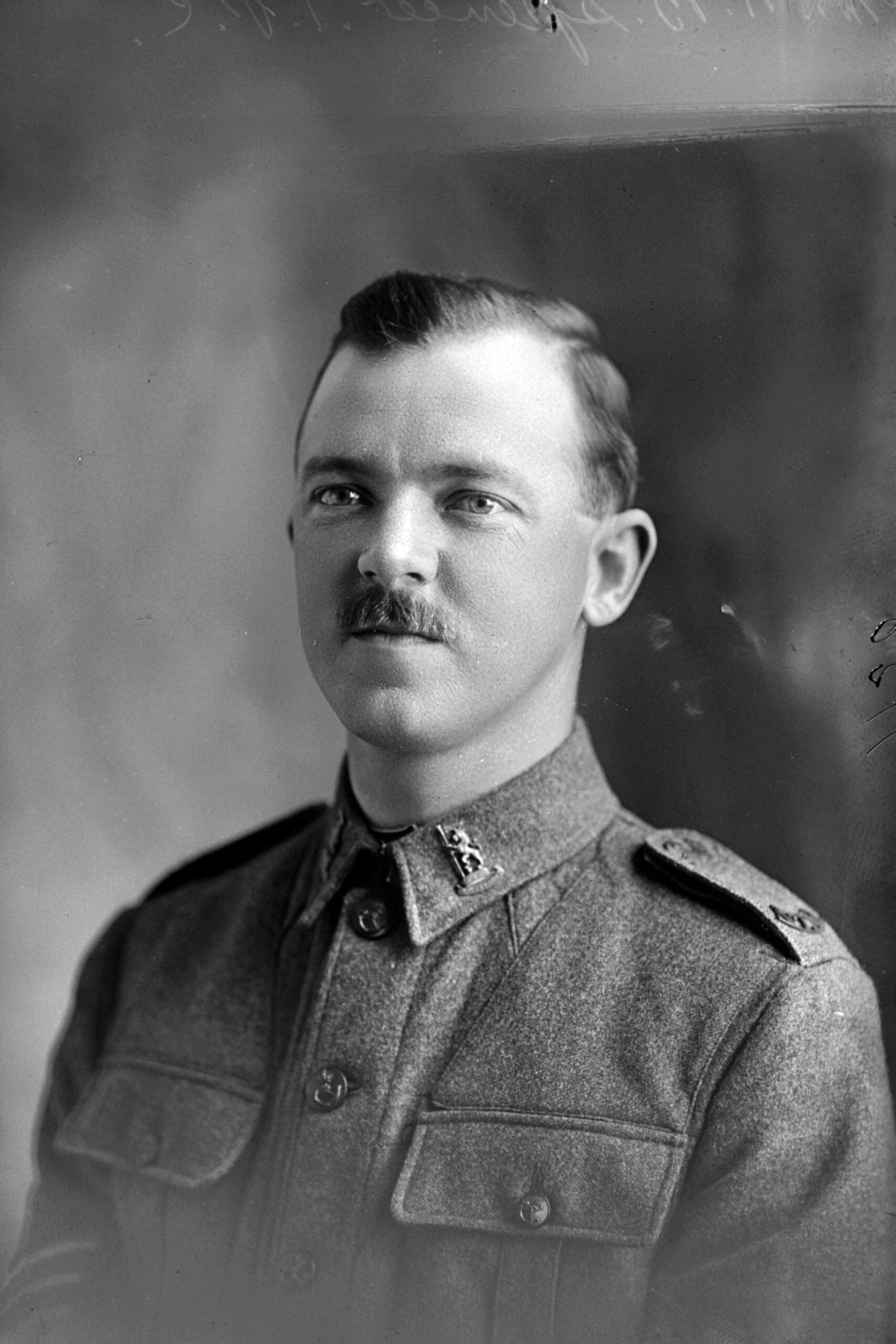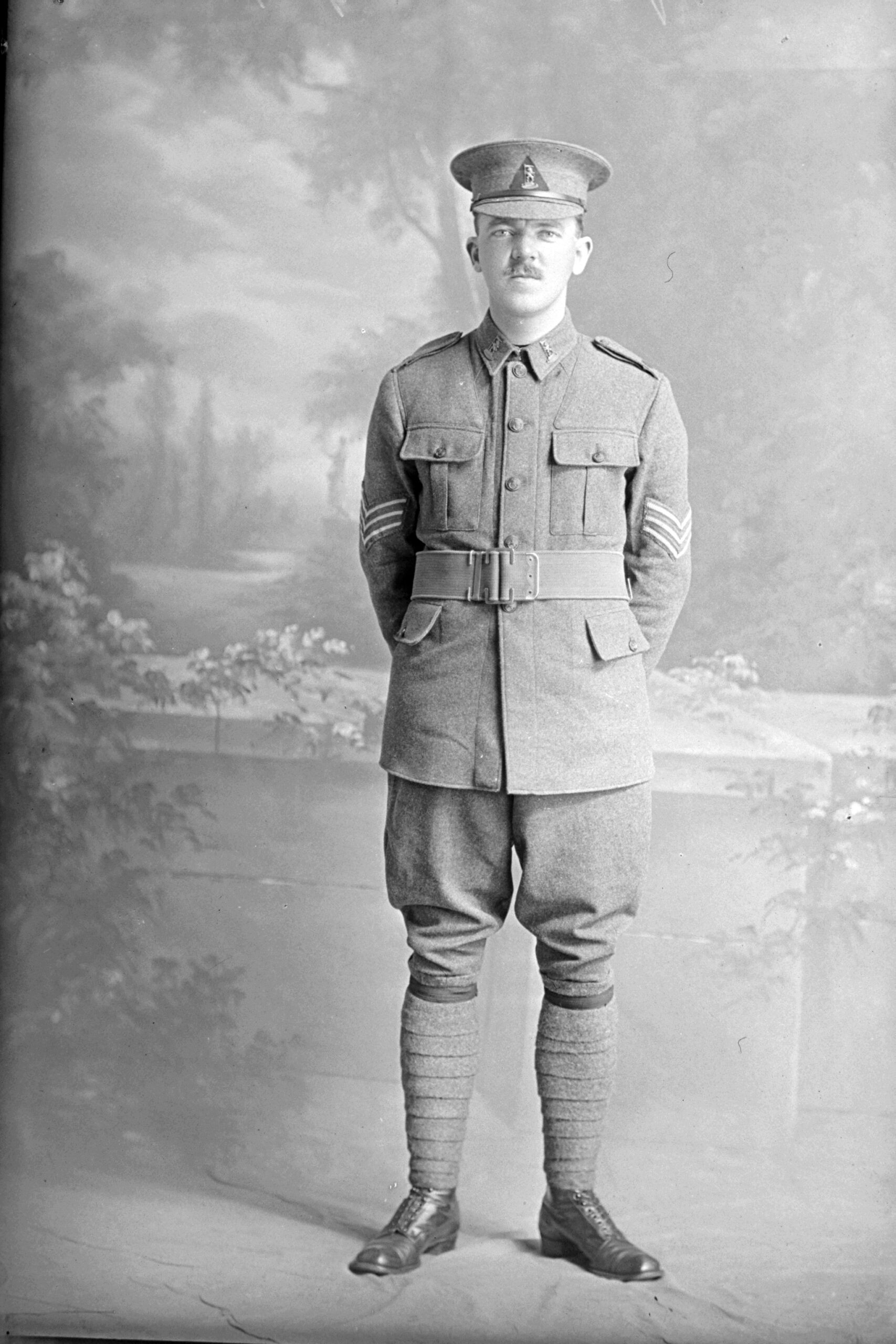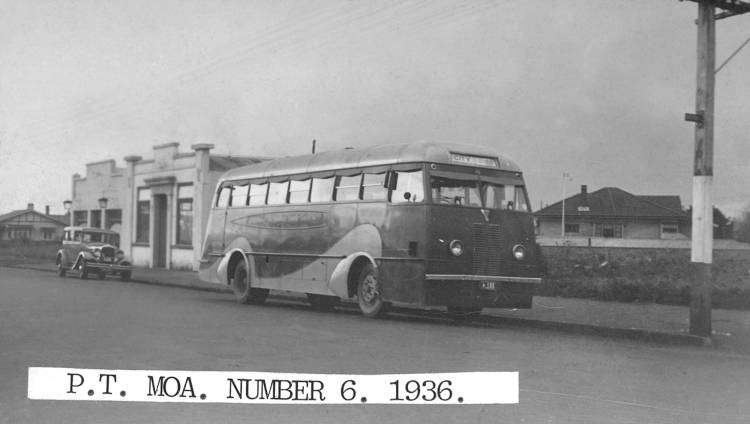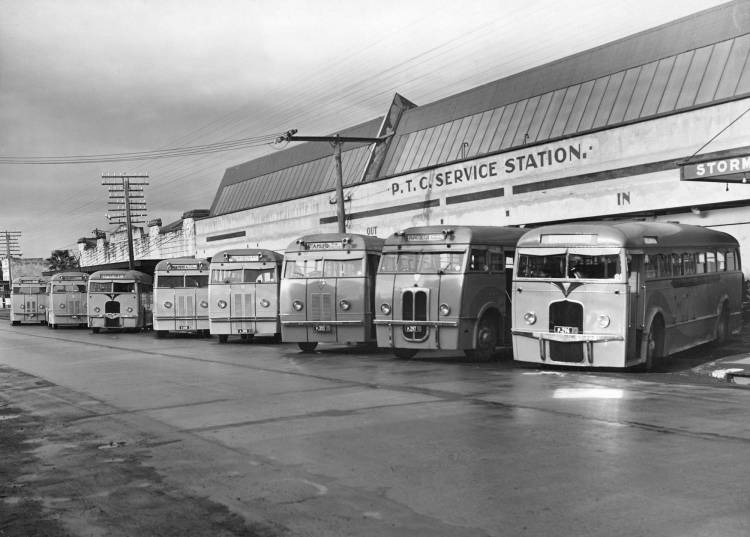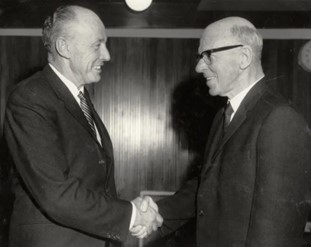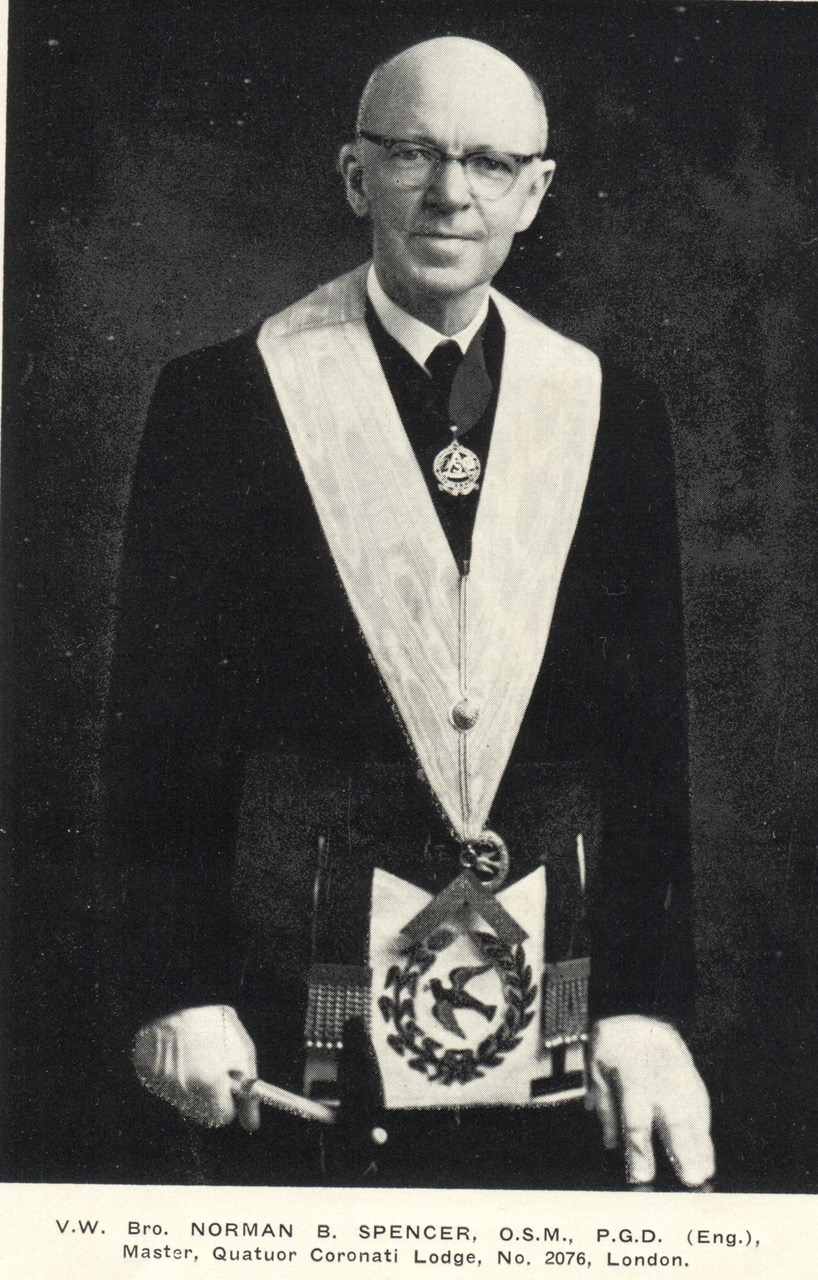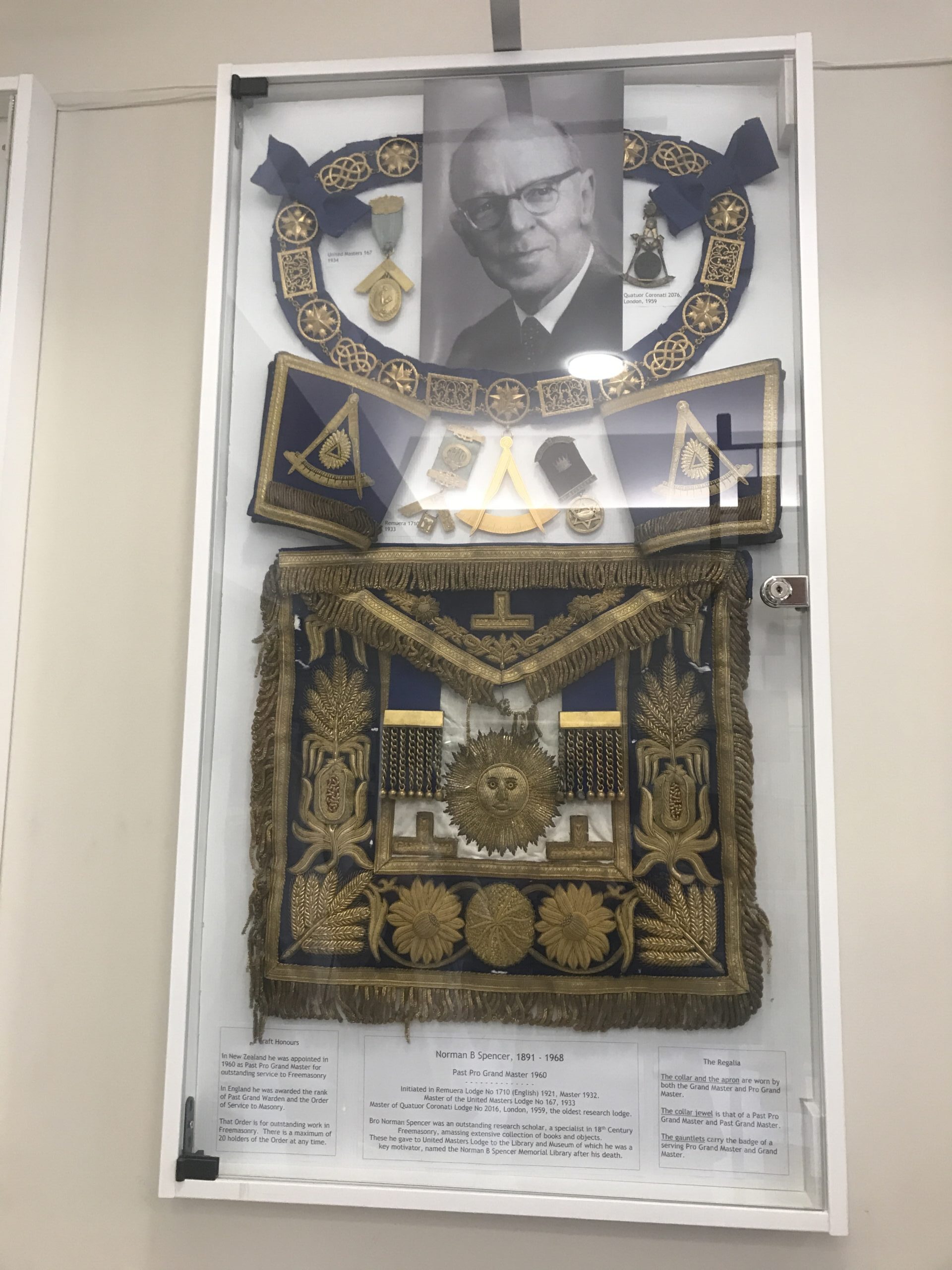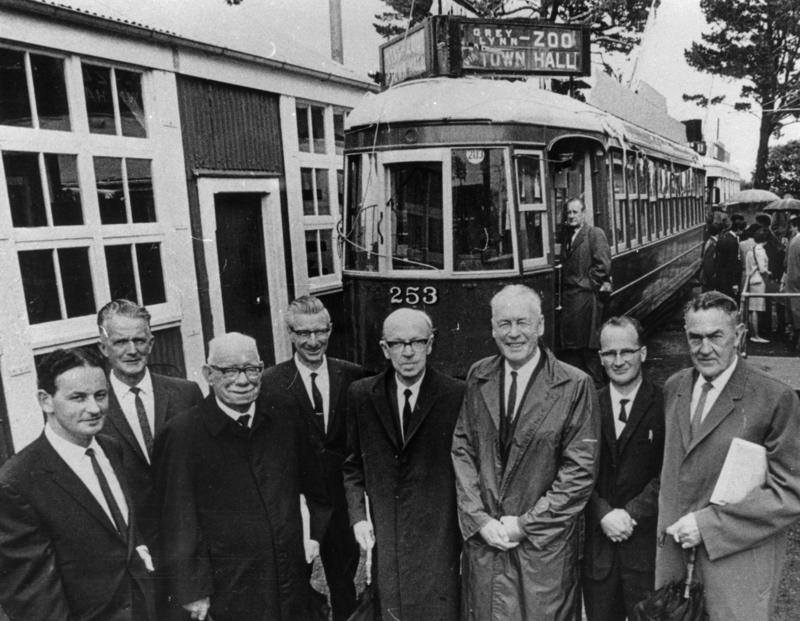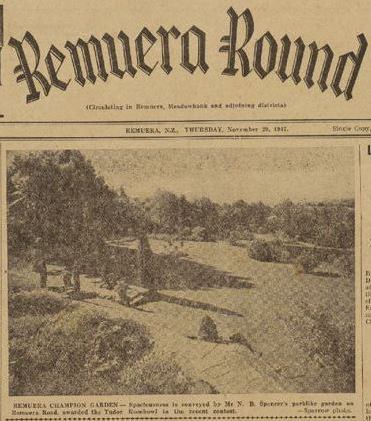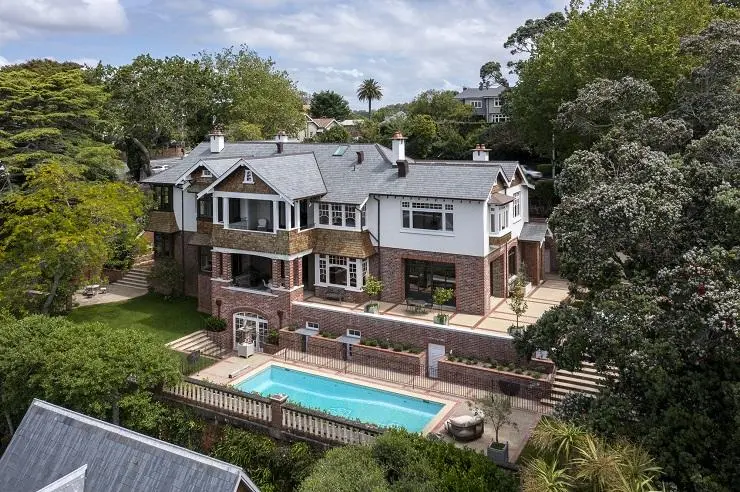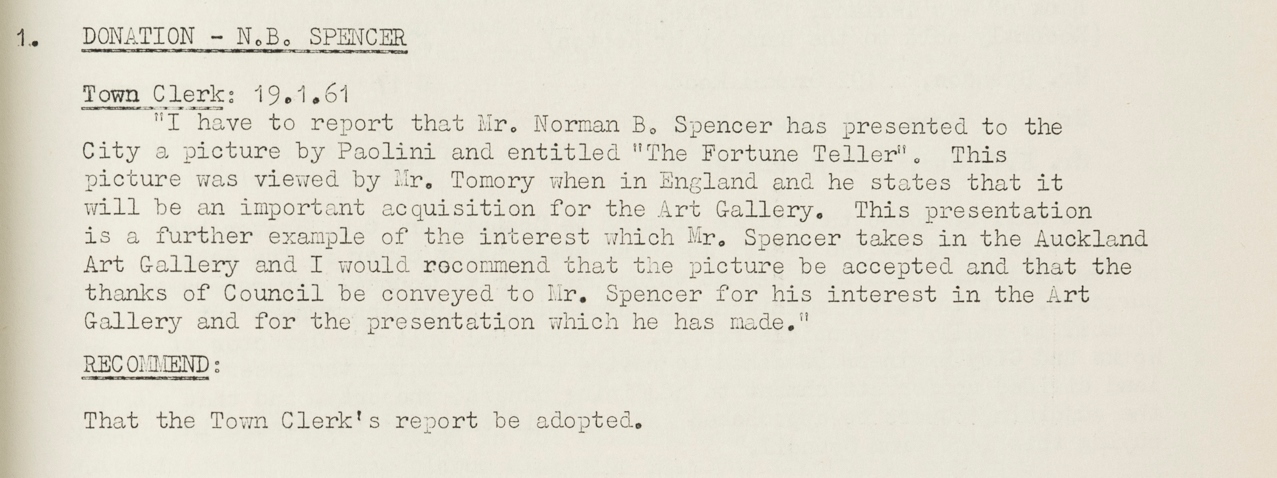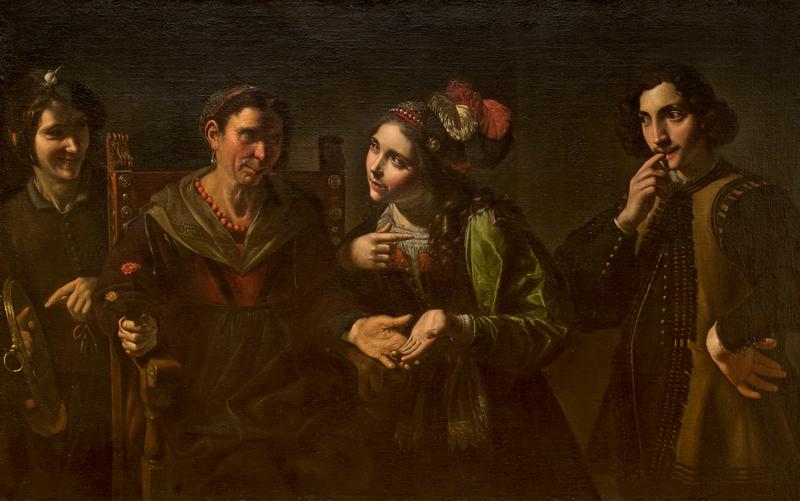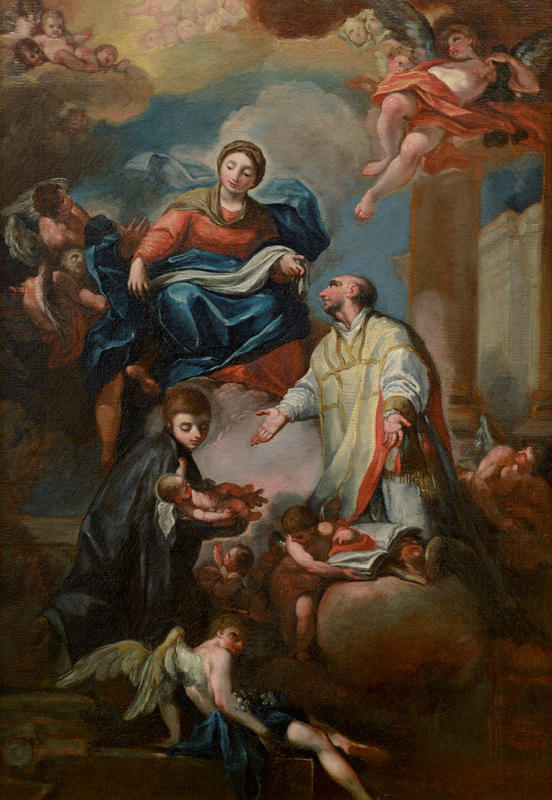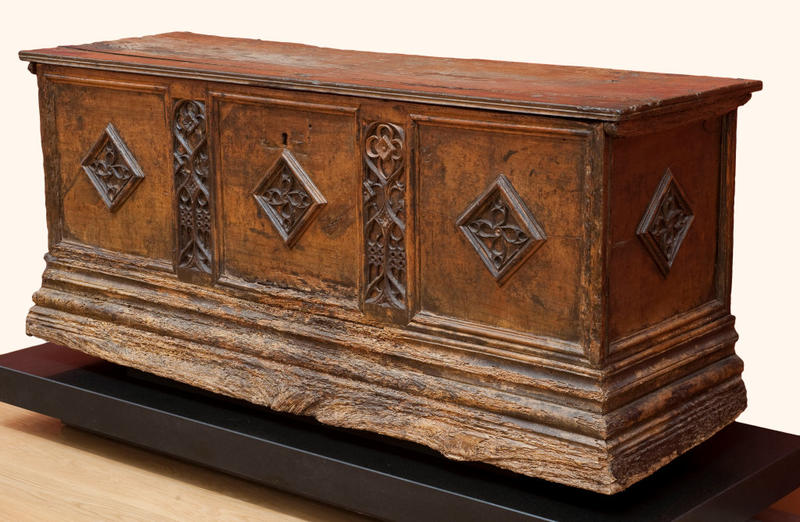Norman Berridge Spencer 1891-1968
Norman Berridge Spencer was a noted businessman, entrepreneur, philanthropist and Freemason who lived in Remuera. His interests included transport, community welfare, art collection and service and research into the history and documentary heritage of Freemasonry.
Norman Berridge Spencer was born on 13th February 1891 in Auckland New Zealand the eldest son of Percy and Lucy (Née Nutter) Spencer.
Percy Spencer who was born in 1859 arrived in New Zealand with his parents, Thomas and Elizabeth (née Berridge) on the ship Mersey on 11th June 1861, the youngest of five Spencer children at that point.
The eldest son also called Percy had little formal education and was apprenticed to a bookseller in Dunedin, but he later joined his father on the goldfields at Thames. Percy married a widow Lucy Insull (nee Nutter) who had one daughter Heath. He began studying law in his forties and eventually practised as a lawyer in Auckland, with Norman subsequently joining his father in his law firm which was then known as Spencer & Spencer. [3]
Norman was the eldest of five brothers and he was educated at Kings College in Remuera from 1897-1900 and then at Auckland Grammar School before going on to study law at Auckland University College which became the University of Auckland through legislation in 1957. [4] He graduated with a Bachelor of Arts and Law in 1913 and was admitted as a barrister and solicitor of the Supreme Court of New Zealand by His Honour Mr Justice Cooper in 1914. [5]
In 1952 Norman Berridge Spencer, B.A., Ll.B., M.Inst.T, Member of the Institute of Transport, was appointed as a Member of the Council of the University of New Zealand for a period of six years by the Governor-General in Council. [6] Spencer also received one of the first of four honorary degrees awarded by Auckland University, with a Doctor of Law degree conferred on him as appreciation for his assistance to the university reflecting his concern for the welfare of students. [7]
[i] Tales of those … who came before – The Spencer Family In New Zealand
With the declaration of War in 1914 Norman Spencer enlisted and sailed from New Zealand on 5 February 1916 as a Sergeant with the 3rdBattalion, B Company, New Zealand Rifle Brigade. He was posted to France in July 1917 and was wounded in August. When he recovered, he was transferred to Army Staff Headquarters in France. Norman was awarded the Meritorious Service Medal (MSM) in recognition of valuable services to the New Zealand Expeditionary Forces (London Gazette 17 June 1918). Norman was selected for Officer training and was transferred to Officer Cadet Training in London, becoming a 2nd Lieutenant in February 1919. [8] After his return to New Zealand, he went into partnership briefly with his father, who at his death, at the age of 83, had the distinction of being the oldest practicing solicitor in Auckland. [9] Norman’s brother Harrison Nutter Spencer subsequently joined the family law firm which was known as Spencer and Spencer and had its offices in Swanson Street.
Throughout his working life, Norman Berridge Spencer was involved in Auckland business and public affairs with his main interest being the Passenger Transport Company. The company was formed in 1925 taking over the services operated by Messrs Dunderdale and Le Grice. It was a small company operating in a limited way in Otahuhu with three buses and when it came on the market it was bought by a group of three interests. Norman acquired his original one third interest for a few hundred pounds, but before too long was sole owner. Once Spencer became involved, the company’s expansion was rapid. [10]
In March 1928 in his capacity as Chairman of Directors of the Passenger Transport Company (PTC) he gave evidence to the Auckland Transport Commission showing that the company provided services to Otahuhu and neighbouring suburbs, averaging 2406 miles a day, had built and occupied a new and up-to-date garage at Otahuhu and purchased an additional six large modern buses. It was seeking permission to establish a service between Otahuhu and Auckland via Favona Road and Mangere Bridge. [11]
The PTC’s distinctive orange and grey fleet of buses was an essential part of south Auckland’s passenger transport service. The PTC had a variety of buses in its fleet including the first diesel bus on New Zealand roads. Moas, Leylands, Stewarts, Daimler and Bedfords were all part of the company’s history as were its various depots in the Otahuhu area. The company moved to Wiri in 1968 with the depot located on the road named after its founder, Norman Spencer Drive. Increasing popularity of private cars and declining patronage eventually took its toll. The PTC was sold to the ARA as a going concern though its fleet’s colours were still seen around south Auckland until 1978 …” [12]
Over his long tenure as owner of the Passenger Transport Company the bus company experienced many of the difficulties still being experienced by bus companies today such as the cost of maintenance and repairs and drivers striking to draw attention to their low wages. During the war, it was particularly difficult as the company was unable to get spare parts or new vehicles, and replacing tyres was also a major problem as they were restricted due to supplies being diverted to the war effort.
In a speech to the Junior Chamber of Commerce in 1940 entitled “Modern Developments in Transport” Spencer foreshadowed the replacement of trams by diesel buses, citing reduced fares and the greater mobility of traffic having a material advantage. The Passenger Transport Company was the second operator in the world to operate diesel buses, though it involved a feat of engineering displaying the New Zealand No 8 wire initiative with the adaptation of a milk separator to convert ship diesel for use by bus engines. Twenty years later, at the New Zealand Omnibus Proprietors’ Association’s annual conference in 1960 Spencer predicted the need for ‘more parking buildings to get cars off busy streets’ to counter increasing congestion. [13]
Norman Berridge Spencer was a Member of the Auckland Transport Board and its Chairman in 1940 and was for many years a member and Chairman of the New Zealand Omnibus Proprietors’ Association, representing the interests of the industry.
Norman was also responsible for founding the Chartered Institute of Transport in New Zealand in 1956. He had been the NZ Corresponding member for the British Institute of Transport and then persuaded the Council in London that New Zealand should formally become a branch.
Other positions held by Norman Spencer were President of the Auckland Chamber of Commerce, 1940 – 41 [14] and the Associated Chambers of Commerce 1942-43. He was a director of Greyhound Bus Co., TEAL, the forerunner of Air New Zealand, Auckland Co-operative Terminating Building Society and a New Zealand Director of the Mercantile Bank of Australia. [15]
Norman Berridge Spencer was also chairman of the Waste Reclamation Committee, part of the war effort, which opened its first waste paper collection depot in Newmarket, and predicted this would result in between £600 and £700 accruing to the Patriotic Council Funds. [16] In 1943 Spencer predicted that the yield would be between £3,000 and £4,000, largely due said the city engineer, “to the enthusiasm of the organiser”. [17]
Norman Spencer continued to support his university during his life through several bequests including $14,000 for an Auckland chair of town planning and finance for the Anglican Hostel, Norman Spencer Hall. His final bequest was for an amount of $4,000 to the Jean Begg University Hall of Residence, directing that the money be invested and the income used to purchase books for the Ella Spencer Library. [18]
Another of Norman Berridge Spencer’s abiding interests was Freemasonry, in which he achieved great honours. He was initiated into the Remuera Lodge in 1921 and by 1932 was Master of the Lodge. In 1959 he was the first New Zealander to be awarded the Order of Service to Masonry (OSM), the highest honour the English Lodge, headquartered in London, can bestow. The OSM was created in 1946 and at the time it was awarded to Norman Spencer there were only eight living holders of the award, and he was just the second person outside Britain to receive the honour. Spencer joined the research lodge in London, Quatuor Coronati, in 1951 after he had contributed a paper on New Zealand Freemasonry and was installed as Master of that Lodge in 1959, which was a rare honour for anyone outside Britain. Norman acquired a significant collection of rare masonic books which he gave to the Freemasons’ Museum and Library.
In 1954 he was involved in the formation of the Research Chapter of New Zealand which was later relocated to the Masonic Temple in Auckland’s St Benedict’s Street. The ‘Norman Spencer Memorial Library and Museum’ was established at St Benedict’s Street following Spencer’s death in 1968. [19] An annual scholarship was established in his name as The Norman B. Spencer Essay Prize. [20] In his will he left $5,000 to lodges in New Zealand, Britain and the United States.
In 1964, Norman Berridge Spencer was awarded the CBE (Commander of the Order of the British Empire), for services in the fields of philanthropy and community welfare. [21]
On 12th March 1940 Norman Berridge Spencer married Isabella, the second daughter of Mrs Eleanor and the late Mr David Mordue Robinson of Darlington, England at St Mark’s Church, Remuera. On 28th January 1942 their daughter, Eleanor Lucy, was born at St Ann’s, Khyber Pass followed on 29th December 1943 by their son, Martin Berridge.
Norman and Isabella began their married life in Dilworth Avenue but shortly after moved to 414 Remuera Road. Advertisements in the New Zealand Herald for an experienced cook at £2 in November and December 1940 and a ‘thoroughly competent’ head gardener in October 1941 showed that they were well settled. This was followed by an advertisement for a Child’s Nurse to work between 8 a.m. and 1 p.m. daily in February 1943.
Isabella complemented Norman’s community service ideals, she was on the committee of the Auckland Lyceum Club undertaking war work in support of the Red Cross and entertaining Air Force personnel, [22] on the board of directors of the YWCA [23] and a committee member of the Auckland branch of the Federation of University Women. [24] She was also on the women’s executive of the Auckland branch of the Obstetrical and Gynaecological Society for which cause, as well as making a handsome donation, the Spencers threw open their prize-winning garden to the public as a fund raising event [25] charging 2/- for entrance and 6d for tea an amount of £40.6.9 was collected. When a similar fund-raising event was held for the Federation of University Women the following report appeared in the local paper:
Perfect garden party weather on Saturday. In Mr and Mrs N.B. Spencer’s garden, “Ngatira”, Remuera Road, sunlight and shadow dappled sloping laws, and to the blue of sky and sea were added predominating blues in the flower beds and frocking of thronging visitors. The party occasion arranged by the Auckland branch of the N.Z. Federation of University Women in aid of its fellowship fund which will benefit by over £150 as a result of sales from stalls and tea. [26]
Mr Norman Spencer’s Garden, Remuera Road, which won the Tudor Rose Bowl for the champion garden of any size, Mr Rix-Trott said that it showed evidence of very careful planning as a whole. Deep thought had been given to the massing of trees and shrubs, and also to their colour effect. There were very fine specimens of trees, some of which would improve with further growth. Particularly admired were the rhus and maples, and a fine collection of magnolias. An African tree, Leucuperum Reflexum, was in itself well worth a visit. The formal garden near the house was good, but a part of the house did not quite harmonise with the scene. Close attention had been made to vista planning with definite contours to give an open and changing view. There were some very fine flowers, some lovely stocks just past their best. Norman employed 3 fulltime gardeners. [27]
The Spencer property extended as far down the slope as Tirohanga Avenue. However, Spencer’s plans were thwarted in his effort to buy adjoining land on Remuera Road when his appeal against the decision of the Auckland Urban Land Sales Committee’s refusal to let him proceed with the purchase of 1 acre 10 perches of land from the Dingwall Presbyterian Orphanage Trust Board for £2,600 was lost, despite his lawyer outlining Spencer’s plans for further developing his property. His Honour Mr Justice Finlay gave his decision for the following reason:
There had been 39 applicants for seven lots in this subdivision. Three acres and 16 perches of the finest building site in a city like Auckland was sufficient for a citizen’s need, and it would be undue aggregation for him to acquire another acre. [28]
In the early 1950’s the Spencers moved to 226 Remuera Road, known previously as ‘Barochan’ but which they called Ngatira – for more information on ‘Barochan’ refer to this website [29] and lived there until the death of Isabella in 1967 after which Norman moved to 1/6 Brighton Road.
Among his many interests, Norman was a keen clock collector and in a street-side ceremony on 27 February 1962, he presented two clocks to be placed on the clock tower of the Remuera Post Office. These clocks, accepted by the Postmaster General, Mr Kinsella on behalf of the citizens of the district were the fulfilment after nearly fifty years of discussion and planning as part of the original plans for the building. [30]
Norman also gifted a significant collection of 22 artworks of paintings and furniture to the Auckland Art Gallery in the 1960s which included works by Paolini, Bordone, Alfred Sharpe, John Gully, John Hoyte, Margaret Stoddart and Charles Blomfield. [31]
Norman Berridge Spencer, CBE, died on 18th February 1968 aged 77 after several years of ill health.
M Cooke, 2024
